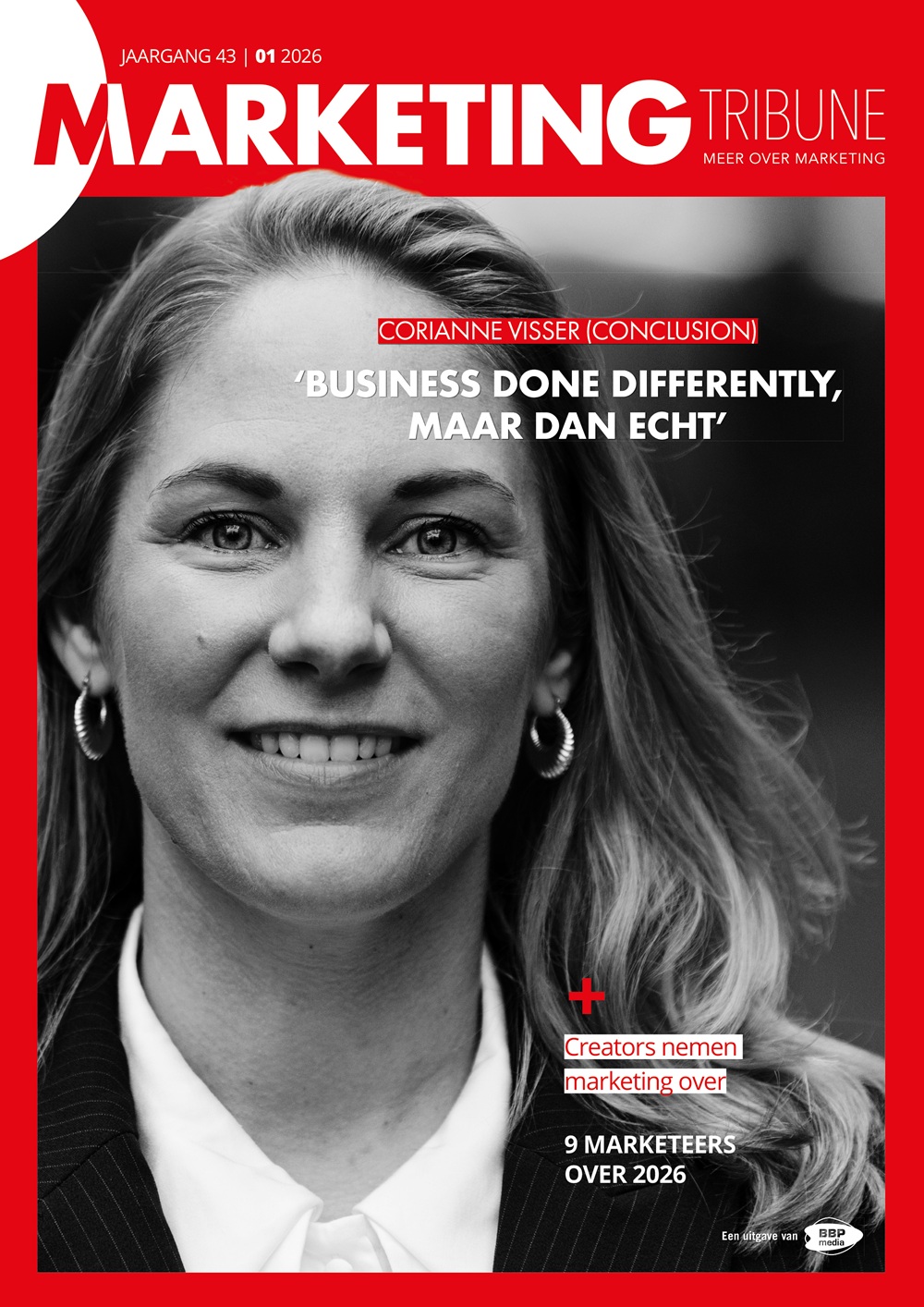Ramon Weterings (Sitecore): Forget about big data, start thinking about intelligent data
- B2b
- 12 nov 2018 @ 09:59
- Link
-
Sjaak Hoogkamer
redacteur
MarketingTribune - Big data
- 12 nov 2018 @ 09:59
- Sjaak Hoogkamer
Experts already agree: Big Data is going to have more influence than the internet now has. Marketingtribune in conversation with Ramon Weterings, VP Sales Western Europe with Sitecore, about big data, the customer journey, privacy and the big challenge for marketers.
More and more data is created by consumers. Everything we do is saved. What you buy, who your friends are, where you drive and which programs we watch. But also what you buy and how much. These data are used to help the customer and to influence him. Should we be pleased with companies that is mapping all these patterns and connections? It brings new jobs, companies and products, but what about our privacy?
Everybody is talking about Big Data, but I get the impression that’s hard for marketers to do the right thing with data. What’s your opinion?
‘The interest from brands into big data has known a huge explosion in the last couple of years, specifically in the e-commerce space, where dynamic pricing, personalized offers and real-time interactions lead to higher productivity, faster growth and increased revenue. I find the term “big data” can sound very overwhelming to marketers, especially those who face challenges in capturing and analyzing the data. Let’s face it, the sheer volume of information and data that can be captured is truly enormous. Couple that with the daunting prospect of trying to analyze it and turning it into actionable insight and you might find it hard knowing where to begin and which data to use to improve the customer experience. What is important for your brand to know about your customers, in order to personalize their experiences?’
What is the importance of data at this moment in marketing? Should their role be more significant and transparent?
‘Why is it so important? No marketing would be possible without some form of data so the importance cannot be overstated. If you’re able to capture relevant data, connect it and map it to the right customer profile, you’ll have a wealth of information at your fingertips to serve the audience exactly what they want by better understanding their intentions. With technology progressing at the blink of an eye, artificial intelligence and machine learning being more and more prominent in day-to-day applications, data will be more significant than ever. The only way we can take advantage of this enormous potential and maximize our ROI from the decisions we take based on the data we capture, is if we are fully transparent with our audience why we need the data we capture at every step of the way. Consumers are also starting to be more wary about the data and permissions that for example apps ask for, such as a camera app asking access to your contacts or your sms history. If brands can prove that the collected data is being used for the sole purpose of providing the best customer experience, then customers will have no problem providing it.’
How can data improve the customer experience/journey without becoming cold and impersonal?
'You’ve probably heard it everywhere lately, but it’s always been the case, customers buy experiences, not products or services. So what makes for a great customer experience? For starters, one where different customers are treated differently - as unique human beings, based on their own specific interests. Customers just want to be recognized and want to be valued. With so many brands lagging behind in defining a solid strategic approach to personalizing the customer experience, it’s no wonder the main question on everyone’s lips is “where do we even begin with personalization?”. The answer: don’t let data gather digital dust in your CRM and use everything you know about your consumers to tailor the message, promotion, pricing, channel and frequency of communication. Personalization however, is about more than knowing your visitor’s name, address, purchase history and access device, and then merely aggregating it into a set of pre-defined categories. It’s about memory creation. Ultimately, customers think about how they feel when they do business with you. That’s the only way to make sure that you keep your marketing humanized and move away from an impersonal approach.
Do people trust companies already enough to do the right thing with data? How do you avoid to get big privacy matters?
'That’s actually a great question and I think we sort of touched upon that in a previous point – as long as you stay transparent and your customers know why you need the data you ask of them, then you will build trust, while avoiding a feeling that you breach their privacy. Keep in mind though that you shouldn’t personalize every single detail of the experience either, where it feels like you know customers better than they know themselves. If it becomes creepy, then customers will be wary of sharing things. You need to find the sweet spot between targeted personalization and too detailed.'
What is the biggest challenge for marketers right now and why?
'That’s by no means an easy question to answer. However we can look at certain factors. In most instances, brands collect what we call “implicit” and “explicit” data. Implicit data looks at a consumers’ device, location, keywords, links, pages visited etc. Explicit data looks at a customer’s name, age, gender, address, preferences, purchasing history etc.The challenge brands are presented with is combining both types of data into actionable insight in order to increase conversions. However, it’s important to keep in mind that different brands have specific data needs. With technological advances knowing an unprecedented pace, the volume of data brands can capture increases exponentially by the year. The real issue brands face is the speed at which they have to capture, analyze and process the data, while making sure it stays reliable and clean.In order to truly leverage the impact big data has on your business and determine the most effective way to convert one-time visitors into repeat buyers and ultimately lifetime customers, it’s important to understand the following:
- Sheer volume of data - the volume of data that can be captured in a digital space increases every year. The side effect here is that what’s being capture isn’t always clean and reliable. Thus, the challenge is to not use corrupted data to take strategic decisions.
- Type of data - implicit and explicit data, while combined give a true 360 degree view of the customer, require the use of different analytical models to understand the functional context it best serves.
- Clean data - quality and relevant data is perhaps of utmost importance. It is essential strategic decisions not be taken because of bad quality or corrupted captured data. It is recommended that periodic CRM clean-ups take place as brands see fit.
- Business value - ultimately the captured data must not just serve as a personalization engine and predictive model into customer’s preferences, but also create business and strategic value that increase sales and revenue.'
How can technology make the life of marketers more easy and pleasant?
'Technology is not a savior by any means – technology is an enabler. Think about it this way, if you put someone at the wheel of a Ferrari that doesn’t even have a driver’s license, he won’t really be able to do much. You need to start by cultivating the right company culture in your organization, one that is behind digital transformation from top to bottom and doesn’t resist change. Couple that with a solid marketing strategy, just the right amount of processes (but don’t get lost in them) and technology and you will have a winning formula. Ultimately there is no one right answer when it comes to your specific industry or company – there is no magical answer to digital transformation success. It all depends on your current maturity, your current organizational structure and what your customers expect.'
In this free ebook from Sitecore, you’ll learn the five keys to using all your data to create highly personalized customer experiences.
-
Sjaak Hoogkamer
- Werkt bij: MarketingTribune
- Functie: redacteur
- Website:https://www.marketingtribune.nl
- Profiel »
Nieuwsbrief
- Mis niets! Schrijf je nu in voor de gratis nieuwsbrief.
- Inschrijven
Laatste reacties
Word abonnee en ontvang:
- ✔ Elke maand MarketingTribune thuis op de mat
- ✔ Maar liefst €100,- korting op alle MarketingTribune events
Meest gelezen
Laatste Nieuws
- Marketingtransfers week 3, 202623-01-2026
- Marketingtransfers week 2, 202616-01-2026
- De vergeten laag van klantbeleving15-01-2026
- Marketplace-bureau Committos richt... 12-01-2026
- AI realitycheck: 2026 wordt het jaar... 12-01-2026
- Marketingtransfers week 1, 202609-01-2026
MarketingTribune Events
- 9apr 2026

Branded Content Event
- 19mei 2026

Retail Media Day 2026
- 11jun 2026

NIMA Marketing Day 2026
De nieuwste selectie whitepapers
- Commerce media: van klikken naar connecties
- From Insights to Impact: AI Strategies for the Modern Contact Centre
- AI SEO: hoe word je gevonden als je klanten ChatGPT gebruiken in plaats van alleen Google?
- Wil je je magazijn slimmer organiseren en klaarstomen voor groei, maar weet je niet waar je moet beginnen?
- The State of AI in Customer Experience 2025




